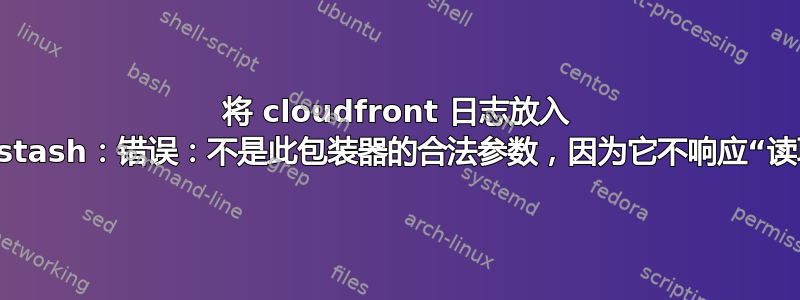
Logstash 版本 1.5.0.1
我正在尝试使用 logstashs3 输入插件下载 cloudfront 日志和cloudfront 编解码器插件过滤流。
我使用 安装了 cloudfront 编解码器bin/plugin install logstash-codec-cloudfront。
我得到以下信息:错误:对象:#Version:1.0 不是此包装器的合法参数,因为它没有响应“读取”。
以下是来自 /var/logs/logstash/logstash.log 的完整错误消息
{:timestamp=>"2015-08-05T13:35:20.809000-0400", :message=>"A plugin had an unrecoverable error. Will restart this plugin.\n Plugin: <LogStash::Inputs::S3 bucket=>\"[BUCKETNAME]\", prefix=>\"cloudfront/\", region=>\"us-east-1\", type=>\"cloudfront\", secret_access_key=>\"[SECRETKEY]/1\", access_key_id=>\"[KEYID]\", sincedb_path=>\"/opt/logstash_input/s3/cloudfront/sincedb\", backup_to_dir=>\"/opt/logstash_input/s3/cloudfront/backup\", temporary_directory=>\"/var/lib/logstash/logstash\">\n Error: Object: #Version: 1.0\n is not a legal argument to this wrapper, cause it doesn't respond to \"read\".", :level=>:error}
我的 logstash 配置文件:/etc/logstash/conf.d/cloudfront.conf
input {
s3 {
bucket => "[BUCKETNAME]"
delete => false
interval => 60 # seconds
prefix => "cloudfront/"
region => "us-east-1"
type => "cloudfront"
codec => "cloudfront"
secret_access_key => "[SECRETKEY]"
access_key_id => "[KEYID]"
sincedb_path => "/opt/logstash_input/s3/cloudfront/sincedb"
backup_to_dir => "/opt/logstash_input/s3/cloudfront/backup"
use_ssl => true
}
}
我成功地使用类似的 s3 输入流将我的 cloudtrail 日志放入基于的 logstash 中回答来自 stackoverflow 帖子。
来自 s3 的 CloudFront 日志文件(我仅包含了文件中的标题):
#Version: 1.0
#Fields: date time x-edge-location sc-bytes c-ip cs-method cs(Host) cs-uri-stem sc-status cs(Referer) cs(User-Agent) cs-uri-query cs(Cookie) x-edge-result-type x-edge-request-id x-host-header cs-protocol cs-bytes time-taken x-forwarded-for ssl-protocol ssl-cipher x-edge-response-result-type
根据 cloudfront 插件 github repo 中的第 26-29 行,标题看起来基本上是正确的格式cloudfront_spec.rb 以及官方的 AWS CloudFront访问日志文档。
有什么想法吗?谢谢!
[更新日期:2015/9/9]
基于此邮政我尝试使用gzip_lines编解码器插件,安装bin/plugin install logstash-codec-gzip_lines并使用过滤器解析文件,不幸的是,我得到了完全相同的错误。看起来这是日志文件的第一个字符的问题#。
为了记录,这是新的尝试,包括由于四个新字段而解析 cloudfront 日志文件的更新模式:
/etc/logstash/conf.d/cloudfront.conf
input {
s3 {
bucket => "[BUCKETNAME]"
delete => false
interval => 60 # seconds
prefix => "cloudfront/"
region => "us-east-1"
type => "cloudfront"
codec => "gzip_lines"
secret_access_key => "[SECRETKEY]"
access_key_id => "[KEYID]"
sincedb_path => "/opt/logstash_input/s3/cloudfront/sincedb"
backup_to_dir => "/opt/logstash_input/s3/cloudfront/backup"
use_ssl => true
}
}
filter {
grok {
type => "cloudfront"
pattern => "%{DATE_EU:date}\t%{TIME:time}\t%{WORD:x_edge_location}\t(?:%{NUMBER:sc_bytes}|-)\t%{IPORHOST:c_ip}\t%{WORD:cs_method}\t%{HOSTNAME:cs_host}\t%{NOTSPACE:cs_uri_stem}\t%{NUMBER:sc_status}\t%{GREEDYDATA:referrer}\t%{GREEDYDATA:User_Agent}\t%{GREEDYDATA:cs_uri_stem}\t%{GREEDYDATA:cookies}\t%{WORD:x_edge_result_type}\t%{NOTSPACE:x_edge_request_id}\t%{HOSTNAME:x_host_header}\t%{URIPROTO:cs_protocol}\t%{INT:cs_bytes}\t%{GREEDYDATA:time_taken}\t%{GREEDYDATA:x_forwarded_for}\t%{GREEDYDATA:ssl_protocol}\t%{GREEDYDATA:ssl_cipher}\t%{GREEDYDATA:x_edge_response_result_type}"
}
mutate {
type => "cloudfront"
add_field => [ "listener_timestamp", "%{date} %{time}" ]
}
date {
type => "cloudfront"
match => [ "listener_timestamp", "yy-MM-dd HH:mm:ss" ]
}
}
答案1
我有同样的问题,从
codec > "gzip_lines"
到
codec => "plain"
在输入中为我修复了这个问题。看起来 S3 输入会自动解压 gzip 文件。https://github.com/logstash-plugins/logstash-input-s3/blob/master/lib/logstash/inputs/s3.rb#L13
答案2
此处报告此错误https://github.com/logstash-plugins/logstash-codec-cloudfront/issues/2
自 2016 年以来未修复
答案3
FTR 这是对我有用的完整配置:
input {
s3 {
bucket => "[BUCKET NAME]"
delete => false
interval => 60 # seconds
prefix => "CloudFront/"
region => "us-east-1"
type => "cloudfront"
codec => "plain"
secret_access_key => "[SECRETKEY]"
access_key_id => "[KEYID]"
sincedb_path => "/opt/logstash_input/s3/cloudfront/sincedb"
backup_to_dir => "/opt/logstash_input/s3/cloudfront/backup"
use_ssl => true
}
}
filter {
if [type] == "cloudfront" {
if ( ("#Version: 1.0" in [message]) or ("#Fields: date" in [message])) {
drop {}
}
grok {
match => { "message" => "%{DATE_EU:date}\t%{TIME:time}\t%{WORD:x_edge_location}\t(?:%{NUMBER:sc_bytes}|-)\t%{IPORHOST:c_ip}\t%{WORD:cs_method}\t%{HOSTNAME:cs_host}\t%{NOTSPACE:cs_uri_stem}\t%{NUMBER:sc_status}\t%{GREEDYDATA:referrer}\t%{GREEDYDATA:User_Agent}\t%{GREEDYDATA:cs_uri_stem}\t%{GREEDYDATA:cookies}\t%{WORD:x_edge_result_type}\t%{NOTSPACE:x_edge_request_id}\t%{HOSTNAME:x_host_header}\t%{URIPROTO:cs_protocol}\t%{INT:cs_bytes}\t%{GREEDYDATA:time_taken}\t%{GREEDYDATA:x_forwarded_for}\t%{GREEDYDATA:ssl_protocol}\t%{GREEDYDATA:ssl_cipher}\t%{GREEDYDATA:x_edge_response_result_type}" }
}
mutate {
add_field => [ "received_at", "%{@timestamp}" ]
add_field => [ "listener_timestamp", "%{date} %{time}" ]
}
date {
match => [ "listener_timestamp", "yy-MM-dd HH:mm:ss" ]
}
date {
locale => "en"
timezone => "UCT"
match => [ "listener_timestamp", "yy-MM-dd HH:mm:ss" ]
target => "@timestamp"
add_field => { "debug" => "timestampMatched"}
}
}
}


